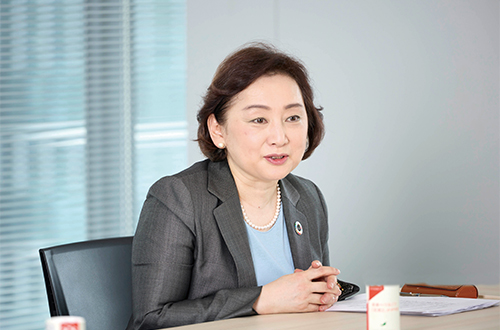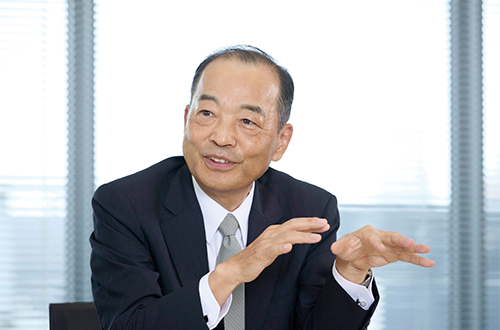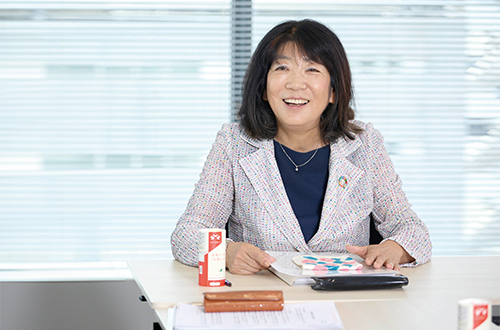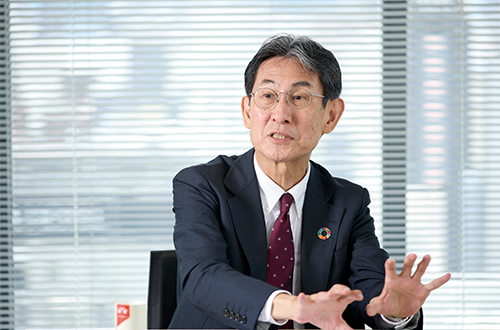Roundtable Discussion with Outside Directors
The Outside Directors offered their thoughts on the Company’s governance system, effectiveness of the Board of Directors, and how the Group will improve corporate value going forward.
The Company’s Governance System
Iwamoto: I believe the important thing in governance is an effective Board of Directors that engages in thorough deliberations, and executives that fully act upon the results of those deliberations to proceed to the next stage in the proper manner. In that sense, I recognize that the Company’s Board of Directors is highly effective, with internal and outside directors actively exchanging opinions. My understanding is that this high level of effectiveness is due in no small part to the leadership of the Board’s chair, President Watanabe, and has sufficiently established a bridge to the executive team.
Shoji: I highly value the fact that in the Board of Directors’ discussions, not only the internal and outside directors but also the internal and outside Audit & Supervisory Board Members actively voice their opinions, which I feel is leading towards even sounder and stronger governance. What I feel is an important issue is Group governance. As an outside director of the Company, which is a holding company, I would like to start taking a closer look at how to make governance effective for the entire Group. In my personal view, we are only halfway there on this point.
Asano: I believe that the governance of the Company is sound. The declaration that the compliance-related impropriety that occurred in the past will never happen again and the sincere efforts to this end are a testament to that. I think what is important in terms of governance is a proper response by the Board of Directors to any impropriety that has occurred. What is even more important is to instill a corporate culture of integrity toward the future and continue to take steps to ensure that the fact that mistakes were made does not fade from memory. I believe that the Group is taking up such efforts head-on to make steady progress.
Kagami: I believe that the Company’s governance system has certainly grown stronger. Following the course of events from the past, preliminary briefings on important proposals began in 2017 with the aim of enriching discussion at the Board of Directors. I believe this has led to very lively discussion at the Board of Directors, including among outside Audit & Supervisory Board members. Then in 2020, the Compliance Committee was established as an advisory body to the Board of Directors and has promoted and continuously monitored Group compliance. At the same time, Audit Office and Corporate Compliance Office personnel visit each site to check on the status of initiatives and improve compliance awareness among employees.
I think that going forward, it will be important for the Company, as a holding company, to further strengthen governance and compliance for the entire Group.

Effectiveness of the Board of Directors
Iwamoto: In addition to strengthening compliance and governance, I recognize that thorough discussion of risk management is essential. There are many risks that the Company must manage as a holding company. Going forward, establishing the scope and proceeding with discussions in a balanced manner should also be taken into consideration. As the Board of Directors of a holding company, it is also necessary to shift focus to discussion of medium- to long-term growth strategies for the entire Group. The progress of overseas business and new business and the issues they face should also be comprehensively understood and supervised.
Regarding the operation of the Board of Directors, while there is active discussion, the fact that it ends up taking too much time may be an issue.
Asano: There have been efforts to limit the number of agenda items related to execution, but realistically, further reduction may be difficult since some are stipulated by the Companies Act. That said, I think there is room for improvement in terms of operation. For example, for matters such as the progress of the Medium-Term Vision that require in-depth discussion, it may be good to set time aside in advance and prioritize such discussion. This would mean securing time by setting matters for discussion that are neither matters for reporting nor matters for resolution.
Shoji: Setting aside time for discussion is very important. I think that the necessary time should be taken to create the Medium-Term Vision and so forth based on in-depth discussion. In that sense, last year, the opinion was expressed that there should be sufficient discussion in drawing up “the Ideal Situation” and “2027 MEDIPAL Medium-Term Vision”, and that hasty decisions should not be made with things not fully worked out, so the decision was made to postpone announcement from spring to fall. As a result, we were able to create an accurate medium- to long-term vision after going through a process of in-depth discussion, which I think was very positive.

Toward Realizing the 2027 MEDIPAL Medium-Term Vision
Kagami: I think that in order to ensure promotion of the growth strategy outlined in the Medium-Term Vision, it is essential for the Board of Directors to monitor strategically important new business and joint ventures with investees and partners and regularly evaluate their progress. Also, when making large-scale investments, it is important to examine what impact such investment will have on the Group’s overall profits and what kind of issues will arise, and properly follow up on the progress even after the decision has been made. I think that an important issue for the Board of Directors is how the progress of such investment projects and so forth is monitored by outside directors.
Asano: The first year of the Medium-Term Vision has gone by, so it is necessary to discuss and share how the executive team views the progress of the Medium-Term Vision and what challenges they perceive. I would like this to be added to the Board of Directors agenda. The executive team is working enthusiastically to achieve the Medium-Term Vision, so I would like to see those results.
Shoji: Progress and evaluation of new business efforts are discussed twice a year. Analysis of progress should be conducted through scientific and quantitative monitoring. As various changes are occurring, it is more important than ever to approach management scientifically, including the PDCA cycle.
Iwamoto: One of the key phrases in the Medium-Term Vision is “business portfolio prioritizations.” Monitoring the progress of new business will lead to discussions on how to proceed with transforming the business portfolio. For the Board of Directors to make an appropriate decision on whether business portfolio prioritizations are proceeding properly, it is necessary to recognize the cost of equity for each business group and proceed with quantitative visualization.

Toward Enhancement of Corporate Value
Kagami: The MEDIPAL Group is now moving toward business transformation. I feel that we outside directors, who are in a position removed from internal common practices and company culture, also need to provide appropriate advice so that this transformation follows the right path and is highly valued by people outside the company. At the same time, compliance issues are a never-ending challenge. We must always keep in mind that the goal is not the here and now. I intend to keep this in mind as I fulfill my role as an outside director.
Shoji: I think it is necessary for the Group to aim to be a company that is respected in the world and can contribute to a sustainable society. I believe that we will be conscious of all our stakeholders and aim to be a good company that offers value from anyone’s perspective. I will do my utmost to support this goal as an outside director.
Iwamoto: Outside directors play an important role in monitoring management to meet the expectations of shareholders and investors. To that end, while maintaining appropriate relationships with the members of the executive team, we will have them provide accurate information on progress and issues in execution so that we may judge the appropriateness of strategies and management while considering the interests of various stakeholders. I believe that this will ultimately lead to improved corporate value in the long term. Our mission is to deliver pharmaceuticals in Japan. The business fields of “Pharmaceuticals, Health, and Beauty” have been established to carry out this mission, which I understand to be the expansion of new business and overseas business. I intend to keep this in mind as I fulfill my duties as an outside director.
Asano: Working to transform the business portfolio and keeping up “constant innovation” will lead to transformation into a stronger corporate group. Of course, we outside directors will spare no effort in achieving the goals that have been set. I hope that all our shareholders, investors, and other stakeholders will take a close look at the Company’s appeal and essence and have high expectations for sustainable growth and efforts to address social issues.

